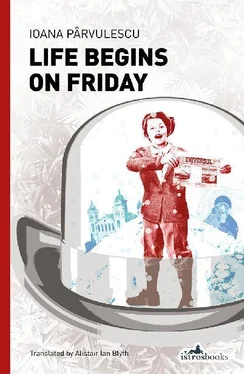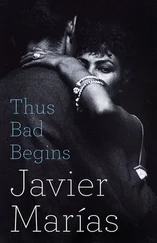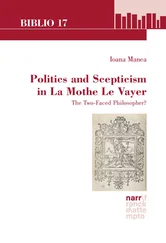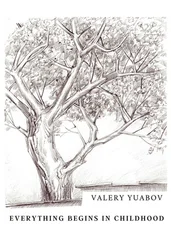‘I will cure you,’ he said, as if he had overheard my thoughts.
I have noticed that sometimes he can read thoughts, exactly like our friend, Mr Costache. The truth is that I have qualms of conscience about how I rebuffed Alexandru yesterday. After my dream of last night I see things completely differently. I think he is in danger and that I have to help him. But what if he is very well, thank you, and I make a fool of myself? Ultimately, I have never refused a visit before, and so why should I start with him? And so I opened the drawer of my writing table and began to search for a special-looking envelope. In the end I selected one which, if you held it up to the light, had a fleur-de-lis in filigree. I pondered for a long time. My mind was not working, probably because I did not have a corpus sanum either. In the end I penned the following:
Bucharest, 23 December 1897
Sir,
Your visit of yesterday caught me at an inopportune moment. I am rather ill, I have conjunctivitis (an illness due to which my eyes have become a mixture of green and red, rather like the colours of garments in Renaissance paintings), I also have other problems, which I will refrain from mentioning to you. Perhaps, if you had taken a few minutes of your time, which, I am sure, is very precious, to write to me at least a day in advance, I would have been able to make our meeting possible. But concern for rules does not preoccupy you. If you nonetheless wish to see me, having been warned about the way that I look, please come on Saturday the 27th to our house at five o’clock in the afternoon. My parents, unfortunately, have to pay a visit. I impatiently await your reply.
Iulia Margulis
The curlicue on my signature was quite dented, a sign that I was out of sorts. I refuse to feel sorry for myself: my eyes, the tooth that must be extracted, les règles , the house cleaning that seems never to end, and which in fact has barely begun, since now Mama is in command, and the bad dream. But as soon as I finished writing the note, I felt better. And since Nicu had come to visit my little brother, I gave him the envelope to deliver to Alexandru, and even gave him his tram fare. A big clock grows inside my heart whenever I am waiting for an answer from him, a clock that runs twice as slowly as it ought to do and whose seconds tick twice as loudly. And it is as if all my other sorrows are smaller and far away, like when you look through the wrong end of a pair of opera glasses.
From her bed, next to his, she could hear the doctor’s even breathing. He was still asleep, weary from the journey of the day before. Rarely did he snore, which was one of his great qualities. There were plenty of wives who took separate bedrooms in order to be able to sleep, because their husbands chugged like trains the whole night through. Agatha thought of the chugging of the train to Giurgiu on Sunday, and the train back, yesterday, which had jolted her every bone. Her back ached more and more frequently, although she wrapped her middle with a woollen girdle, and now she could feel a migraine coming on. That was all she needed, when she had so hard a day ahead and so tiring a day behind. Perhaps next year they ought to rear their own pig. So long a journey was not worth it, although it was good to have everything prepared and ready, admitted Mrs Margulis. She lit the gas lamp by the side of the bed. It was still pitch black, but she lay back down so as not to waken her husband: the floor creaked rather loudly.
It had been a pleasant surprise to meet their friend Costache on the return journey. He was alone, and so they moved from the other end of the carriage into his compartment, bringing with them the small suitcase, which emanated delicious odours. They had had to surrender the larger suitcase at the baggage car. The doctor had gone with the porter to the baggage cassa , not a quarter of an hour before the train’s departure, as required, but a half an hour earlier. Their baggage was weighed: thirty-two kilos, and they had been relieved of it. It was therefore easy to move to Costache’s compartment. Outside it was gloomy, snowflakes stuck to the windowpane, revealed their starry patterns for an instant and then melted, but inside it was warm, there was light, they felt sheltered, and the conversation flowed more easily than ever. It was as if you had guests, but without the attendant burdens of the host. The time melts like snowflakes. You know that you have a few suspended hours, in which you have nothing whatever to do, except to glide across the white fields, as if you were flying. They had hesitated before setting off, because in winter the train sometimes got stuck in snowdrifts. But the newspapers had not forecast any blizzards.
‘What is the news about the stranger who was found on Friday, Dan Crețu?’ asked Agatha. ‘People have started talking all kinds of nonsense, and our children — which is to say Jacques mostly — believe he fell from the sky.’
Costache, who was always highly discreet when it came to the cases he was working on, told them that he had not found out very much, but hoped in time to bring everything to light and, without his realizing it, he found himself telling his old friends the story of Rareș Ochiu-Zănoagă and the awkward moments he had spent at the young man’s family estate. The policeman had seen many things in his time, but he was still not accustomed to some. He still felt affected by the grief of the parents, who on learning the news had been ripped from the soil of their lives like trees at the height of a tempest. Such a thing ought not to exist in the plan of the world, he said. The child was an artist and sometimes caused them to worry, and it is true, they used to be on tenterhooks because of his frequent trips to Bucharest, but nothing, except perhaps the presentiments of the blood that bring you tidings before any messenger, could have foretold such an end. With the sister of the young Rareș — he found out from her that the lad was not yet twenty-two, Iulia’s age — he had managed to speak for somewhat longer, although the girl’s eyes kept turning red and she had been unable to utter a word. She was given smelling salts a number of times, but she was a brave girl, she did not faint, and kept choking back her tears. The boy, Rareș, was talented at painting, and every June, he went to Bucharest, where he worked as a volunteer, restoring church frescos. It was his passion and in recent years there had been frequent restorations in Bucharest. No sooner had he finished in one church than he was sent to another. When he was just ten-years-old, a mural painter from Giurgiu had allowed him to climb the scaffolding in the church he was working on and to paint the eyes and mouth of St Constantine and his mother, St Elena, who had become rather smoke-blackened because of the candles. The lad had taken the brush from the painter and working with his child’s hand he had displayed an unusual talent. The priest came in and angry lest the painting be ruined, he shouted at both the painter and the lad. It was then that the first portent occurred, for Rareș took fright and fell off the scaffolding. You should have seen how the priest’s hand trembled when he cradled the blond head in his palms and saw the closed eyes. You should have seen how Mama, who had been talking to somebody in the churchyard, ran inside and took him in her arms as if he were an infant. But on that occasion they had merely had a fright, nothing worse.
The policeman lowered his voice and urged them to treat with the utmost confidentiality what he was about to tell them, and both Agatha and the doctor, sitting opposite him, leaned forward to hear. He told them the last words spoken by the young man, the visible relief on his face, and how he seemed to die at peace.
Читать дальше












